Be Aware

Welcome to Be Aware, an online knowledge hub set up and run by NYSCP to help prevent and tackle child exploitation.
NYSCP has developed and hosts a series of North Yorkshire-centric and appropriate national resources to provide information, raise awareness and develop knowledge across areas of child exploitation.
Click below to head to the page you wish to view:
Child Sexual Exploitation (CSE)
Contextual Safeguarding
Child Criminal Exploitation (CCE), including County Lines
Financial Exploitation
Sexualised Behaviour in Children (Harmful Sexual Behaviour)
Missing From Home and Care
Modern Slavery and Child Trafficking
Online Exploitation
MACE:
Learn all about our Multi-Agency Child Exploitation and Contextual Safeguarding Strategy (MACE), including procedures and frequently asked questions, here:
Local Offers of Help & Disruption:
There are many services that can offer support for young people who are at risk of exploitation or who are victims of exploitation. More information about the disruption of exploitation in North Yorkshire can be accessed in the following video:
Anyone can make a referral to the Children and Families Service. To make a referral, you can contact the North Yorkshire Multi-Agency Screening Team (MAST) if you are worried about any child and think they may be a victim of neglect or abuse, whether as a member of the public or as a professional. Our one-minute guide about making a referral to the Children and Families Service can be found here.
To find out more click here: NYSCP (safeguardingchildren.co.uk)
The North Yorkshire and York Trusted Relationships Project is one way in which young people aged 10-17 who are at risk of criminal exploitation are accessing support.
Through the project, young people are assigned to trained workes to build a trusting relationship with over a long period of time and develop skills to protect them from exploitation.
Currently, young people are referred to the project by North Yorkshire Children & Families Service.
To find out more about the service, click here.
Age range: 10 – 25 years
Target: Children and young adults at risk of exploitation or frequently missing from home.
SOS+ is an award-winning extension to the St Giles’ gangs project. The approach uses trained professionals to equip children and young people to think critically, assess risk and make better life choices, making them more resilient to the risks of becoming involved in gangs, exploitation and violence.
SOS+ puts trained staff with lived experience at the heart of the solution. Having once been involved in gangs, exploitation and violence themselves, staff are imbued with passion and collective desire to ensure the young people they work with do not make the same mistakes they once did.
The service offers:
*Prevention and awareness raising across educational settings
*Parent/carer information sessions
*Professionals/teacher training
*Intensive mentoring for those most at-risk via embedded support in schools and other community settings
*Supporting victims of exploitation
*Support the impacts of crime and rebuild the resilience from harm experienced.
Find out more: SOS+ – St Giles (stgilestrust.org.uk)
email: northyorkshireSOSplus@stgilestrust.org.uk
Leaflets available: NYSCP (safeguardingchildren.co.uk), NYSCP (safeguardingchildren.co.uk)
Referral form: NYSCP (safeguardingchildren.co.uk)
Ivison Trust helps parents across the UK, including in North Yorkshire, understand what is happening to their children and how parents are the people who are best to help their children exit exploitative relationships.
Parent Liaison Officers (PLOs) offer direct one-to-one work with parents affected by exploitation. The PLO includes parents as partners whilst recognising their needs as a parent of an exploited child. The PLO will formulate co-created safeguarding plans that address the extra-familial risk alongside partner agencies and support parents to gather information and intelligence to help partners target and disrupt the offenders and locations. Throughout service delivery, the PLO supports the recovery and safety of the child and family.
Below is one parent’s experience of receiving support from Ivison Trust :
“Regaining my power”
When my child was being used and abused by a gang linked to organised crime, it took over my family. I was trying to keep my child safe and get help from services. Whilst there were a lot of agencies involved, their whole focus was on my child and there was little support for me. It felt as if the agencies were at a loss as to what to say to me and at times were quite blaming of me. I felt very alone managing a really tough situation. I started to feel so lost, worn down and as if I no longer had any choices. I started to shut down, close off, and give up because I felt so down.
I dread to think what might have happened to us if my guardian angel – the parent liaison officer from Ivison Trust- hadn’t arrived when she did. Her first words to me were, ‘I’m here for you. This isn’t your fault.’ It was life-changing to have someone there for me and to start feeling as if there was a way out. I felt this relief as if a physical weight had been lifted from my shoulders. It gave me a drive again, to have hope and to get back up and keep pushing.
The parent liaison officer (PLO) helped me in loads of ways. She pointed out what I had been doing to keep my child safe and how I’d been trying to work with all the agencies involved. She challenged some of the negative attitudes towards me and helped my voice to be heard in meetings. I’d been sharing lots of information and intelligence with the police and it felt very risky to do this because I was terrified that the gang would find out and that there’d be retaliation attacks and risks to our lives. My PLO worked with services to make sure that there were plans in place about how information would be acted upon. My PLO helped me to move areas, which helped my child to find a way out and heal. I, like most parents, needed support to support my child. We all need someone on our side.
For more information on Ivison Trust visit their website here: About Ivison Trust – Ivison Trust
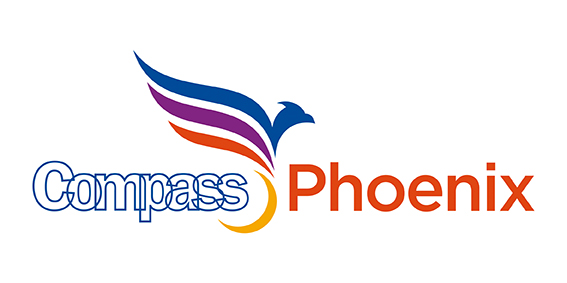
The aim of the Compass Phoenix service is to improve outcomes for children and young people in relation to their emotional well-being and mental health by strengthening the range of mental health support available to children and young people.
More information can be found about making a referral on their website here.
Compass offers a confidential text messaging service to young people aged 11-18 across North Yorkshire.
Text 07520 631168 for confidential advice, support and signposting from a wellbeing worker within one working day via text.
When you text BUZZ US, you’ll get a message back letting you know if we’re open or closed. It’ll also tell you what you can do if we are not open and you need help in the meantime.
This might include contacting your doctor, visiting an NHS walk-in centre or calling NHS 111. You can also look up your local child and adolescent mental health service (CAMHS) crisis number. Also, remember that if it is an emergency dial 999 or visit A&E.
Text us!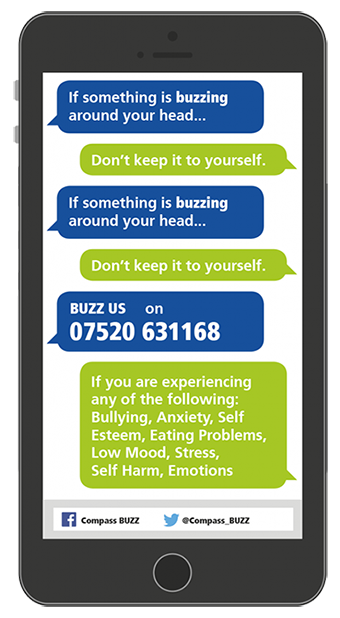
Young people can text BUZZ US about any mental health or well-being worries. Such as low mood, stress, eating problems, self-harm, anxiety or self-esteem.
We will get back to you within a day during the week.
If that feels like too long and you are in need of urgent help or you feel in crisis, please contact the help suggested above and here.
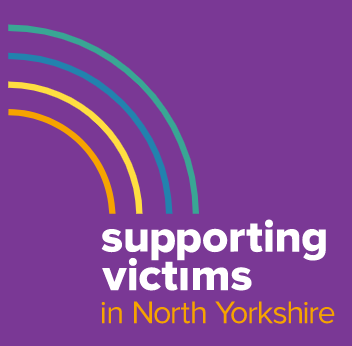
Supporting Victims can provide support for anyone affected by crime, whether reported or not, including victims, bereaved relatives, parents or guardians of victims under 18 and members of staff where a business has been a victim of crime.
We can provide a range of practical and emotional support but if necessary we can also help you access support provided by other organisations.
Emotional and practical support
Over the telephone and/or face-to-face support by trained and experienced staff
Referral with consent to specialist victim services provided through our partners
Signpost to other support organisations as appropriate
Everyone deals will the impact of crime differently and has their own way of coping, which varies enormously depending on the support you have around you and your personal circumstances.
Our staff are trained and experienced in being able to help you understand what has happened and support you to cope and recover from the experience of crime. Our staff are trained to listen to you and give you advice and guidance on how to get your life back on track.
Often just talking to someone, especially someone independent from your family and friends, can help enormously.
The impact of a crime often isn’t just emotional it can be practical. We also work with a range of other specialist organisations who we can refer you to or you can contact directly.
![]()
Welcome to the home of well-being and mental health for young people in North Yorkshire. We’re here to help you find the right help and support for you, to help you stay well, whatever is going on in your life. The Go-To – Emotional wellbeing and mental health (thegoto.org.uk)
Change Direction is a prevention and early intervention support scheme for young people aged 10-17 in North Yorkshire, who may be committing antisocial behaviour or very low-level offences, with the intention of diverting them away from the Criminal Justice System.
The Change Direction diversion scheme will engage with young people, at an early stage before criminal behaviour becomes habitual, to improve circumstances for both the young person and also the local community. The young person will be provided with nurture and support, from a dedicated keyworker, in order to begin to address any underlying causes of future criminal behaviour. The young person’s engagement with the Change Direction scheme will be on a voluntary basis.
The overall aims of the Change Direction scheme are to:
Reduce the number of young people entering the criminal justice system as a first-time entrant
Reduce Crime and Antisocial Behaviour incidents in localised areas of North Yorkshire and the City of York
Reduce re-offending by young people
To support young people to make positive progress against their identified needs.
The Change Direction Diversion scheme, provided by North Yorkshire Youth, will be trauma-informed and offer multiple and wide-ranging methods of engagement and intervention, which will be led by the interests of the young person. The support offered will enable young people to work towards goals and achieve outcomes, and the intensiveness of the support will be responsive to each young person’s needs.
Key components of the Change Direction scheme
An initial assessment of needs and strengths and the production of a tailored support plan
The offer of one-to-one and group work
Practical support and emotional trauma-informed support where required
Advocacy and support to access specialist services
The delivery of in-house interventions
Referral to existing commissioned services and other specialist services
Planned exit with an offer of peer support
Measurement of progress against identified needs
Community Outreach
The Change Direction scheme will also undertake community outreach engagement and will adopt some of the principles of detached youth work, in order to encourage engagement from young people within local communities. This will be driven by local intelligence and will be informed by any key issues young people may be facing in specific areas.
The community outreach engagement work will have a particular focus on identifying young people from hard-to-reach groups or communities, or socially isolated rural communities across North Yorkshire and the City of York. As well as those young people who might not yet be known to existing keyworker services, such as the Youth Justice teams, or those who may have fallen through service gaps who are not currently working with keyworker services but may be known to NYP or the Community Safety Hubs.
Referrals to the Change Direction Diversion Scheme
Referrals are welcome from a range of agencies.
Referrals to the scheme can be made via this link. You will be required to enter your email address and then you will be sent an email, click on the appropriate link for the Change Direction scheme. Once submitted, the referral form will go directly to North Yorkshire Youth who will then make contact with the individual to arrange an appointment.
Alternatively, you can request a referral form from Clare Yates, Youth Development Manager at clare@nyy.org.uk. Referrals are welcome from a range of agencies including schools/education settings, Community Safety Hubs and North Yorkshire Police.
The referral form and Information sheet can be accessed on the North Yorkshire Youth Site: Change Direction Youth Mentors | North Yorkshire Youth (nyy.org.uk)
Provided by Humankind, the Crossroads Adult Diversion scheme’s goal is to prevent or intervene early to divert people from the criminal justice process by addressing the underlying causes of their offending behaviour. The overall aims of the Adult Crossroads Diversion scheme are to:
Reduce the number of first-time entrants into the Criminal Justice System
Reduce re-offending and antisocial behaviour
Assess the needs of those on the scheme across the criminogenic pathways and evidence positive progress to address those needs
The Crossroads Adult Diversion scheme works with women and men aged 18+ to offer trauma-informed support to address the underlying causes of offending. Each individual will receive a tailored support package, the intensity of which will be responsive to their assessed needs. A dedicated keyworker will be allocated who will provide direct interventions, advocate and signpost into specialist agencies where necessary.
The scheme has two elements:
A community-based support scheme for adult women or men aged 18-25 who may be at risk of entering the Criminal Justice System or are known to North Yorkshire Police. The scheme will engage with individuals, at an early stage before criminal behaviour becomes habitual, to improve circumstances for both them and the local community. Engagement will be on a voluntary basis. The community-based scheme is open to those who are not offending or have been involved in antisocial behaviour or committed very low-level offences. Various agencies may be working with individuals at this stage, and any agency can refer to this element of the scheme. To refer, click on the link below. You will be required to enter your email address and then you will be sent an email, click on the appropriate link for the Crossroads Adult Diversion scheme. Once submitted, the referral form will go directly to Humankind who will then make contact with the individual to arrange an appointment: https://firstlive.orcuma.com/nyp
Referrals can also be made via a referral form and Humankind also welcome self-referrals. To self-refer, request a referral form or for further information contact Alice.Skelton@nyhorizons.org.uk or Humankind.diversionary.services@nhs.net or alternatively call 07939209087.
A Pre-Court Diversionary support scheme, for adult women or men aged 18-25 at point of arrest or voluntary attendance at police custody. This is an alternative to prosecution, and if the individual accepts the referral to the Crossroads Adult Diversion scheme engagement will be mandatory, otherwise, the individual may be referred back to North Yorkshire police to face prosecution. Only North Yorkshire Police can refer to this element of the scheme. The referral form can be found on Niche and the completed referral form should be sent to Humankind at diversionary.services@nhs.net
![]() Leaders Unlocked are offering free workshops on avoiding county lines as part of Phase 2 of ‘The Long Game‘, a youth-led project funded through the Community Safety Serious Violence Fund by York and North Yorkshire Combined Authority, Policing, Fire and Crime. Now entering its second phase, we are expanding across York and North Yorkshire to deliver free workshops for the following groups.
Leaders Unlocked are offering free workshops on avoiding county lines as part of Phase 2 of ‘The Long Game‘, a youth-led project funded through the Community Safety Serious Violence Fund by York and North Yorkshire Combined Authority, Policing, Fire and Crime. Now entering its second phase, we are expanding across York and North Yorkshire to deliver free workshops for the following groups.
These workshops are delivered by Adam, a young person with lived experience of exploitation in the county lines system. The Long Game Workshop is for young people to reduce their risk of involvement in county lines and modern slavery in North Yorkshire.
Following its recommissioning, The Long Game is expanding across York and North Yorkshire, delivering free workshops in:
Mainstream education – Raising awareness, spotting the signs, and prevention
Alternative settings – For young people at higher or immediate risk of CCE
Professional training – For those working with children and young people
About The Long Game:
Engaging, youth-led sessions with 3 tailored variationsYears 7-11
College-age students
For Professionals working with young people
Flexible group sizes – we can adapt to assemblies, classroom sessions, or smaller workshops (1 hour – 1.5 hours + break in the middle).
Adam is DBS-checked and accompanied by a Leaders Unlocked team member.
Topics Covered:
✔ Modern slavery & county lines
✔ How grooming works & how to spot the signs
✔ The reality of organised crime gangs
✔ Escape strategies & long-term planning
This is a great opportunity to give students real insight from someone with lived experience to in order to prevent their involvement in county lines and modern slavery.
Let me know if you’re interested or have any questions, we can arrange a call to discuss further. We’re also happy to join partnership meetings to explore collaboration opportunities.
Feel free to reach out to amber@leaders-unlocked.org to book workshops or discuss training opportunities for professionals.
Further resources:
Sharing Intelligence:
North Yorkshire Police relies on intelligence from communities, partners and other law enforcement agencies. The sharing of intelligence is a key tool in the disruption of child exploitation in North Yorkshire.
** We are pleased to announce North Yorkshire Police can now accept online reports from partners via our website. These will be directed to the Force Control Room (FCR) and dealt with just like a 101 call. In the case of partner intelligence, this will route directly to the Intelligence Unit from our website.
This service offers you (our partners) the opportunity to submit forms through a standardised format, used by a growing number of Police forces across England and Wales. There is no need to wait on the phone. Accessible on computers, tablets and mobile the forms make it easier to share details from your systems. They are structured around the details we need to act quickly and keep people safe **
Additional resources for schools.
Following a consultation with school PSHE leads across North Yorkshire a collection of lesson plans and additional resources for schools can be accessed below.
North Yorkshire Police have produced a resource centre for school DSL’s. The resource houses key information about local police contacts, and the role of school Liaison Officers, alongside other resources and local offers of support. The site can be accessed here:
North Yorkshire Police – Support for DSL’s – North Yorkshire County
The Children’s Society: Working with Education to Protect Young People from Exploitation An online toolkit to help school staff develop their understanding of exploitation and how best to respond. The toolkits serve two purposes. They provide opportunities for children and young people to learn about exploitation and be confident in recognising and responding to signs and indicators of this, and they are also designed to help reduce school exclusions for young people who are at risk – school exclusions can increase the chances that a young person will be exploited.
‘What would you do’ playing cards. Each card has a different scenario and poses the question to young people what would they do in that situation? The cards are a really useful discussion-based tool to stimulate debate. Resources | Crimestoppers (crimestoppers-uk.org)
Catch On is a free educational resource about Child Exploitation aimed at pupils in Years 7 and 8 (aged 11-13).
The resource contains a suite of options for a single lesson or series of lessons exploring the topic of grooming and exploitation. Materials include lesson slides with embedded links and videos; comprehensive lesson plan guidance with photocopiable activity sheets; and a handbook for parents and professionals.
The resource has been written by a team of frontline practitioners and a curriculum lead from one of our Catch22 schools. The aim is to make children aware of child exploitation, empower them to recognise the warning signs, and know where to go to get help if they or their friends are targeted.
Downloads – Fearless Professionals Running the Lines’ – Fearless film raises awareness of how ‘county lines’ drug gangs exploit young people to sell drugs. The story follows Evan who is groomed, exploited and threatened into becoming a drug runner for a London-based organised crime gang.
Exploited (thinkuknow.co.uk)
This film explores issues of emotional and sexual abuse within teenage relationships. Lauren and Sophie each have a new boyfriend, but whilst Sophie and Danny are learning how to respect and care for each other, Lauren finds herself at risk of exploitation and abuse from Marcus and his friends. 14-year-old Chloe is already one of his victims, and her experience helps the audience to see the difference between healthy and unhealthy relationships. The film also shows how Marcus himself is being exploited by older men, thus highlighting how this behaviour can affect boys as well as girls.
Key issues covered
This film examines:
How to spot the signs of an abusive relationship
Negotiation and honesty within healthy relationships
Grooming, including blackmail and coercion
Peer pressure
The law around the age of consent
How to seek help, and what happens after a report is made
Target audience
This film is aimed at young people aged 14 and over. It may be suitable for learners 11-13 with appropriate adult support. The film deals with the issue of sexual exploitation and facilitators should follow the guidance on page two of the lesson plan before starting the session.
Talk Relationships: delivering sex and relationships education | NSPCC Learning
All Lesson Resources – Not In Our Community – Protection against exploitation – a series of resources and videos and accompanying lesson plans, alongside interactive resources covering numerous topics focused on exploitation. (age suitability is clearly stated on each video).
It’s Not OK: online teaching resources | NSPCC Learning
It’s Not OK helps children and young people recognise concerning behaviour and identify characteristics of positive relationships. The lesson plans, films and accompanying activities cover what behaviour to look out for and how to respond to it.
It’s Not OK reinforces the importance of building and maintaining positive relationships and recognising and responding to behaviour relating to:
· online safety
· grooming
· sexting
· harmful sexual behaviour
· child sexual abuse
· child sexual exploitation.
The Children’s Society: Working with Education to Protect Young People from Exploitation An online toolkit to help school staff develop their understanding of exploitation and how best to respond. The toolkits serve two purposes. They provide opportunities for children and young people to learn about exploitation and be confident in recognising and responding to signs and indicators of this, and they are also designed to help reduce school exclusions for young people who are at risk – school exclusions can increase the chances that a young person will be exploited.
PANTS resources for schools and teachers | NSPCC Learning Download our free Talk PANTS resources, teaching children the Underwear Rule to help keep them safe from abuse.
We’ve developed:
lesson plans
slide presentations, and
classroom activities
to help schools and teachers talk PANTS with their pupils, without ever using scary words or even mentioning sex.
You will also find resources for early years settings, working with diverse groups and links to the relevant curriculum areas in each of the four nations.
All Lesson Resources – Not In Our Community – Protection against exploitation a series of resources and videos and accompanying lesson plans, alongside interactive resources covering numerous topics focused on exploitation. (age suitability clearly stated on each video).
Jessie & Friends: online safety education for 4-7s (thinkuknow.co.uk) education for 4-7s
What is it?
Jessie & Friends is a three-episode animated series which aims to equip 4-7-year-olds with the knowledge, skills and confidence they need to help them stay safe from sexual abuse and other risks they may encounter online.
Play Like Share (thinkuknow.co.uk) Play Like Share is a three-episode animated series (c. 6-7 minutes each) and accompanying resource pack which aims to help 8-10-year-olds learn how to stay safe from sexual abuse, exploitation and other risks they might encounter online.
Alright Charlie – CSE Primary School Resource – Basis (basisyorkshire.org.uk)
Basis Training, together with the Blast Project supported the development of a gender-neutral, age-appropriate video resource (Alright Charlie) for raising awareness of child sexual exploitation (CSE) in primary schools. Workbooks for professionals and young people can be downloaded free of charge here:
Professional Guidance
Alright Charlie YP Workbook
The Children’s Society: Working with Education to Protect Young People from Exploitation An online toolkit to help school staff develop their understanding of exploitation and how best to respond. The toolkits serve two purposes. They provide opportunities for children and young people to learn about exploitation and be confident in recognising and responding to signs and indicators of this, and they are also designed to help reduce school exclusions for young people who are at risk – school exclusions can increase the chances that a young person will be exploited.
Love Life: resources for young people with learning disabilities | NSPCC Learning
Helping young people explore topics such as emotions, relationships and identity
The films and supporting resources are aimed at young people aged 11 to 25 to help them learn strategies for staying safe as they grow up and gain independence.
They enable adults to start conversations with young people about:
· feelings
· privacy and boundaries
· friendship
· different kinds of love
· online safety.
Play Like Share Subtitled (thinkuknow.co.uk) Play Like Share is a three-episode subtitled animated series (c. 6-7 minutes each) and accompanying resource pack which aims to help 8-10-year-olds learn how to stay safe from sexual abuse, exploitation and other risks they might encounter online.
PANTS resources for schools and teachers | NSPCC Learning Developed in consultation with children, parents, carers and teachers, Talk PANTS is here to help children understand their body belongs to them, and they should tell a safe adult they trust if anything makes them feel upset or worried. A range of leaflets and resources have been produced to help those with additional needs have simple conversations to help keep children safe from sexual abuse.
The following resources can be used to support early years practitioners to deliver key safety messages linked to exploitation:
4-5s Homepage | CEOP Education (thinkuknow.co.uk): The CEOP Education team is part of the National Crime Agency. We run a national online safety education programme, which provides training, resources and information for children and young people aged 4 – 18, their families and professionals who work with them.
This website is a part of our programme.
The characters on this website also feature in Jessie & Friends, a three-episode animated series for 4-7 year olds.
Safety Cards – Ineqe Safeguarding Group: A one-page guide on how to stay safe on the most popular platforms.
Internet safety advice and information | Internet Matters: See how to support your child’s online safety at any age with these guides to their habits, interests and concerns. Early Year (0-5s) Pre-school (0-5) online safety tips and advice | Internet Matters
Digiduck: An educational, e-safety story app for 3-7 years | Internet Matters: The story has been created to help parents teach children aged 3-7 years of age how to be good friends online. It’s a great way to start the conversation about what they should expect from the online world and how to stay safe.
Smartie the Penguin | Childnet: The Adventures of Smartie the Penguin is a series of six stories for use with 3 to 7-year-olds to help explore life online and understand how and when to ask for help.
PANTS resources for schools and teachers | NSPCC Learning: Developed in consultation with children, parents, carers and teachers, Talk PANTS is here to help children understand their body belongs to them, and they should tell a safe adult they trust if anything makes them feel upset or worried.
Remember, as an early years professional you may pick on conversations about older siblings or information that is happening in local communities. It is vital that these concerns are shared to work together to help tackle and disrupt exploitation.
The Children’s Society has also released a series of resources as part of their #LookCloser campaign: Working with Education to protect young people from Education. Lesson plans are available for Primary, Secondary and Special Schools. The resource can be found using the following link: https://register.childrenssociety.org.uk/page/111066/data/1
Page reviewed: October 2025



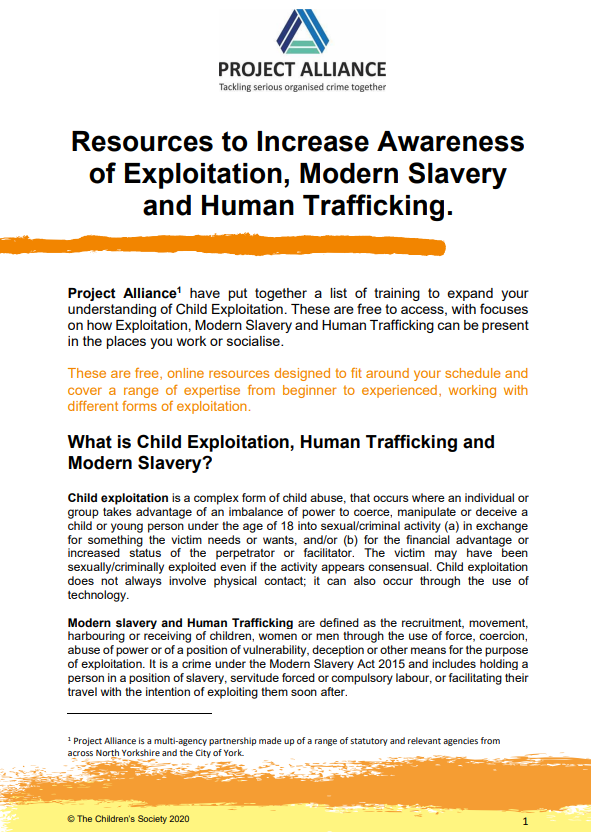

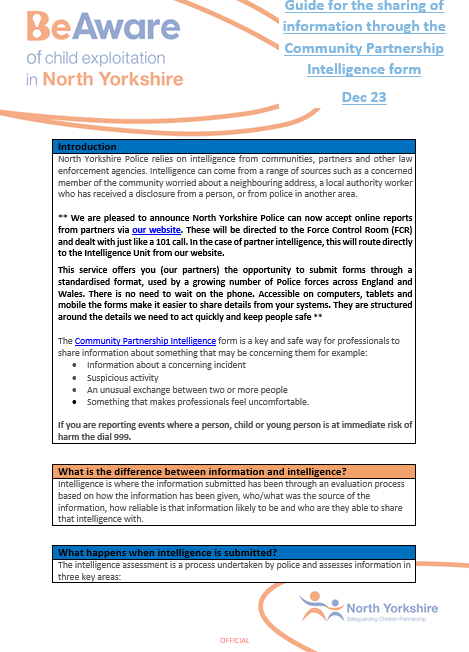
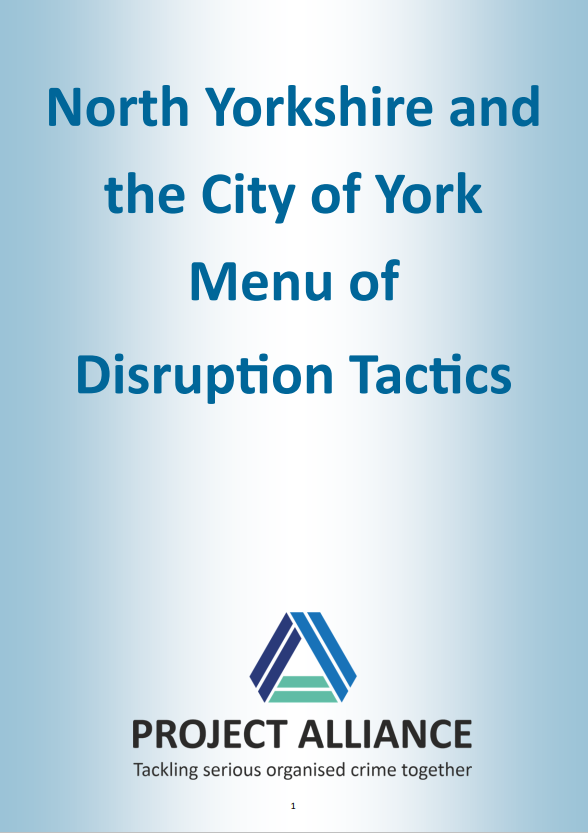


 View all our news
View all our news